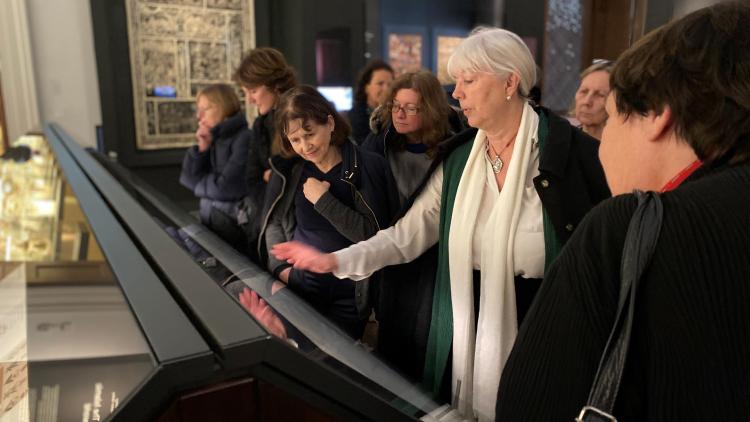BA Chinese


Key information
- Start date
- Duration
- 4
- Start of programme
- September
- Attendance mode
- Full Time
- Location
- SOAS on Campus
- Fees
-
Home student fees: £9,250
Overseas student fees: £21,990Please note that fees go up each year.
See undergraduate fees for further details. - Course code
- T100
- Entry requirements
-
ABB
Contextual: BBB
-
Austria: Reifeprufungszeugnis / Maturazeugnis: four subjects at 1, 2, 2, 2
A Level equivalent: ABB
Contextualised offer: BBB -
Belgium: Diploma van Secundair Onderwijs: 75% (7.5/10, 15/20) overall
A Level equivalent: ABB
Contextualised offer: BBBInformation for prospective students from Belgium
-
Bulgaria: Diploma za Zavarsheno Sredno Obrazovanie: 5.3 and 5.0 in two State Maturity Exams
A Level equivalent: ABB
Contextualised offer: BBB -
Canada: High School Diploma: 80% with 5 acceptable Grade 12 subjects (most territories).
British Columbia: AABBB in Grade 12 courses.A Level equivalent: ABB
Contextualised offer: BBBInformation for prospective students from Canada
-
China: Senior Secondary Graduation Certificate + Gaokao: 78% overall in Gaokao PLUS 85% overall in Senior Secondary School Graduation Certificate (year 11 and 12)
A Level equivalent: ABB
Contextualised offer: BBBInformation for prospective students from China
-
Croatia: Matura Certificate: 4.5 overall with 5 in 1 Higher level subject
A Level equivalent: ABB
Contextualised offer: BBB -
Cyprus: Apolytirion with 2 A-Levels: Apolytirion 18/20 + A-level grades BB
A Level equivalent: ABB
Contextualised offer: BBB -
Czech Republic: Matura Certificate: 1, 2, 2, 2
A Level equivalent: ABB
Contextualised offer: BBB -
Denmark: Studentereksamen; Hojere Forberedelseseksamen; Hojere Handelseksamen; Hojere Teknisk Eksamen: 7 plus 10, 7, 7 in three Level A subjects
A Level equivalent: ABB
Contextualised offer: BBBInformation for prospective students from Denmark
-
Estonia: Gümnaasiumi lõputunnistus with the Riigieksamitunnistus: 4.0 with 85%, 80%, and 80% in 3 state exams
A Level equivalent: ABB
Contextualised offer: BBB -
Finland: Ylioppilastukint / Studentexamen: four subjects at 6, 5, 5, 5
A Level equivalent: ABB
Contextualised offer: BBB -
France: French Baccalaureat or Option Internationale du Baccalauréat (OIB): 13/20
A Level equivalent: ABB
Contextualised offer: BBBInformation for prospective students from France
-
Germany: Abitur: 1.8
A Level equivalent: ABB
Contextualised offer: BBBInformation for prospective students from Germany
-
Greece: Apolytirion of Geniko Lykeio with Pan Hellenic exams: 18/20
A Level equivalent: ABB
Contextualised offer: BBBInformation for prospective students from Greece
-
Hong Kong: Hong Kong Diploma of Secondary Education: 544 in two electives and one core (all other subjects grade 3)
A Level equivalent: ABB
Contextualised offer: BBBInformation for prospective students from Hong Kong
-
Hungary: Matura (Erettségi): 4.5 overall
A Level equivalent: ABB
Contextualised offer: BBB -
Iceland: Stúdentspróf: 7.5
A Level equivalent: ABB
Contextualised offer: BBB -
India: Standard XII: 75% (CBSE, CISCE, Tamil Nadu, Maharashtra & West Bengal boards), 80% (all other state boards)
A Level equivalent: ABB
Contextualised offer: BBBInformation for prospective students from India
-
Ireland: Irish Leaving Certificate: H1, H2, H2, H3, H3
A Level equivalent: ABB
Contextualised offer: BBB -
Israel: Bagrut: Overall grade of 7, 80% with 3 subjects at 5-unit level
A Level equivalent: ABB
Contextualised offer: BBBInformation for prospective students from Israel
-
Italy: Diploma Consequito con L’Esame di Stato: 80% overall
A Level equivalent: ABB
Contextualised offer: BBBInformation for prospective students from Italy
-
Latvia: Certificate of General Secondary Education: 88% in four State subject exams
A Level equivalent: ABB
Contextualised offer: BBB -
Lithuania: Brandos Atestatas: 8.5/10 and 90%, 85%, 85% in three State Exam
A Level equivalent: ABB
Contextualised offer: BBBInformation for prospective students from Lithuania
-
Malta: Advanced Matriculation Certificate: AB (Advanced) + BBB (Intermediate)
A Level equivalent: ABB
Contextualised offer: BBB -
Netherlands: Voorbereidend Wetenschappelijk Onderwijs: 7.5 overall with 8, 8, 7, 7 in four subjects
A Level equivalent: ABB
Contextualised offer: BBB -
Norway: Vitnemål vidergaende opplaering: 4.3 overall
A Level equivalent: ABB
Contextualised offer: BBBInformation for prospective students from Norway
-
Poland: New Polish Matura: 75% in three Advanced Level subjects
A Level equivalent: ABB
Contextualised offer: BBBInformation for prospective students from Poland
-
Portugal: Diploma de Ensino Secundario: overall 17.5/20
A Level equivalent: ABB
Contextualised offer: BBB -
Romania: Diploma de Bacalaureat: 8.5 overall
A Level equivalent: ABB
Contextualised offer: BBBInformation for prospective students from Romania
-
Singapore: Polytechnic Diploma (Nanyang, Ngee Ann, Singapore, Temasek and Republic Polytechnic): GPA 3.3
A Level equivalent: ABB
Contextualised offer: BBBInformation for prospective students from Singapore
-
Slovakia: Maturitná skúška / Maturita / Vysvedčenie o maturitnej skúške: four subjects at 1, 2, 2, 2
A Level equivalent: ABB
Contextualised offer: BBB -
South Africa: National Senior Certificate: 77666
A Level equivalent: ABB
Contextualised offer: BBBInformation for prospective students from South Africa
-
Spain: Curso de Orientación Universitaria / Título de Bachillerato: 7.5
A Level equivalent: ABB
Contextualised offer: BBBInformation for prospective students from Spain
-
Sweden: Slutbetyg / Examensbevis från Gymnasieskolan: A in 1200 credits and no grades below D / 18 / mainly B overall (MVG/VG)
A Level equivalent: ABB
Contextualised offer: BBB -
Switzerland: Federal Maturity Certificate: 4.5
A Level equivalent: ABB
Contextualised offer: BBB -
Tanzania: Advanced Certificate of Secondary Education: ACSE with BBB in 3 principle subjects
A Level equivalent: ABB
Contextualised offer: BBB -
Trinidad and Tobago: CAPE: Six CAPE units with grade 2 (+two double-unit courses)
A Level equivalent: ABB
Contextualised offer: BBB -
Turkey: Lise Diplomasi: 78-83% (depending on high school)
A Level equivalent: ABB
Contextualised offer: BBB -
USA: High School Diploma plus ACT, SAT, or AP exams:
-
High School Diploma GPA 3.0 plus SAT 1280 or ACT 27 and 2 AP's at 4,4
or -
High School Diploma GPA of 3.2 plus 2 AP's at 4,4
or -
High School Diploma GPA 3.4 plus SAT 1300 or ACT 29
or -
2-year Associate degree GPA 3.1
A Level equivalent: ABB
Contextualised offer: BBB -
-
See undergraduate entry requirements and English language requirements for international and alternative entry requirements.
Course overview
The BA Chinese single subject degree provides you with the highest level of competence in all aspects of the written and spoken language, as well as an in-depth understanding of both classical and modern Chinese culture, from the study of pre-modern Chinese language and history to modern literature and cinema.
You will spend the third year of study in China or Taiwan furthering language proficiency and understanding of the local cultural environment. The Chinese BA programme is suitable for both absolute beginners as well as those with some knowledge of the Chinese language.
Why study Chinese at SOAS?
- We are ranked 12th in the UK for Modern Languages (QS World University Rankings 2023)
- SOAS is home to the largest concentration of Chinese specialists outside of China
- Chinese is a language spoken by a quarter of the world’s population; your command of a language will set you apart from graduates of other universities
- spend your third year in China or Taiwan furthering language and cultural proficiency
- learn not only the essential language skills but also an in-depth understanding of the region’s culture covering subjects (such as literature, history, cinema, etc.)
- flexibly structure your programme using our central options modules to take advantage of the expertise of our other departments
- our students consistently take home top prizes at the prestigious Chinese Bridge competition
Structure
Students take a total of 120 credits each year .
- Year 1: Students normally take 60 credits of language, 45 credits of culture/history modules and 15 credits of academic writing.
- Year 2: Students take a further 30 credits of modern language and are introduced to classical and literary Chinese, and further modules of culture/history.
- Year 3: Students will spend the third year of study in China or Taiwan
- Year 4: Students take a minimum of 90 credits from the department, which includes a compulsory Independent Study Project.
Important notice
The information on the website reflects the intended programme structure against the given academic session. The modules are indicative options of the content students can expect and are/have been previously taught as part of these programmes. However, this information is published a long time in advance of enrolment and module content and availability is subject to change.
Year 1 - Core and Compulsory
Year 2 - Core and Compulsory
Year 2 - Guided options - List A
15-45 credits from List A
Year 2 - Guided options - List B
Up to 30 credits from List B or open options
Year 4 - Core and Compulsory
Year 4 - Guided options - List A
30-60 credits from List A
Year 4 - Guided options - List B
Up to 30 credits from List B or open options
Teaching and learning
All full-time undergraduate programmes consist of 120 credits per year, in modules of 60, 30 or 15 credits. They are taught over 10 or 20 weeks. The programme structure shows which modules are taught over one term or the full year. It also shows which modules are compulsory and which are optional.
Contact hours
As a rough guide, 1 credit equals approximately 10 hours of work. Most of this will be independent study. It will also include class time, which may include lectures, seminars and other classes. Some subjects, such as learning a language, have more class time than others.
Year abroad
Students spend the third year of their BA Chinese degree at Beijing Normal University (BNU) or Taiwan. Single-subject degree students are required to take the following modules:
- Newspaper Reading (baokan 报刊)
- Reading and Writing (duxie 读写)
- Conversation (huihua 会话)
- Listening (tingli 听力)
SOAS Library
SOAS Library is one of the world's most important academic libraries for the study of Africa, Asia and the Middle East, attracting scholars from all over the world. The Library houses over 1.2 million volumes, together with significant archival holdings, special collections and a growing network of electronic resources.
Pre-entry readings
- Ebrey, Patricia: The Cambridge Illustrated History of Chinese Civilization. Cambridge: Cambridge UP, 1996/2010.
- Mair, Victor H.: The Columbia History of Chinese Literature. New York: Columbia University Press, 2001.
- Shei, Chris: Understanding the Chinese Language. London and New York: Routledge, 2014.
Fees and funding
Fees for 2023/24 entrants per academic year
| Programme | Full-time | |
|---|---|---|
| Home students | Overseas students | |
| BA, BSc, LLB | £9,250 | £21,160 |
| BA/BSc Language year abroad | £1,385 | £10,580 |
Please note that fees go up each year.
For full details see undergraduate fees.
Employment
Graduates from the Department of East Asian Languages and Cultures develop competencies in intercultural awareness, analysis and communication. Demand for specialists with advanced proficiency in the languages of China, Japan and Korea has significantly increased in recent years, and graduates with these skills are highly sought after by employers.
Recent graduates have been hired by organisations including:
- Accenture
- Amazon
- Bloomberg LP
- Department for Work and Pensions
- European Alliance for Human Rights in North Korea
- European Commission
- ITN
- Japanese Government
- Korea Trade Centre (KOTRA)
- KPMG
- Mizuho Bank
- Nagahama Board of Education
- Nanjing Museum
- Pinsent Masons LLP
- PwC
- Seoul Metropolitan Government
- Shelterbox
- UNDP
Find out about our Careers Service





